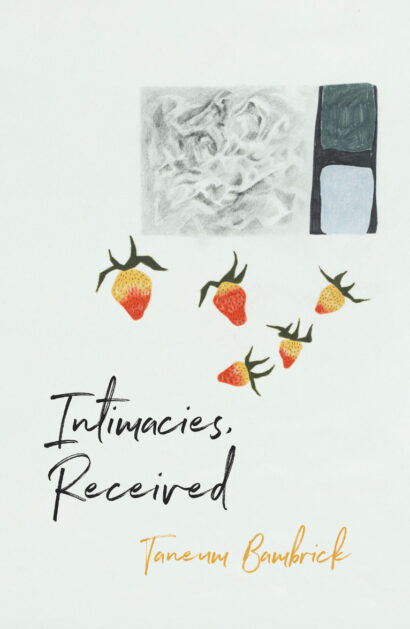Book Review: Taneum Bambrick’s Intimacies, Received

Intimacies, Received by Taneum Bambrick (Cooper Canyon Press, 2022)
Taneum Bambrick’s Intimacies, Received is a stunning second collection. Bambrick explores sexual and gender-based violence, illness, and queer sexuality through the speaker’s experiences as a survivor of sexual assault. With images of meat carving, quiet moments of physical closeness, and forms like ekphrasis and a lyric essay, Bambrick illustrates how violence haunts each intimate encounter.
The collection follows a speaker during her time in Spain, seven years after her sexual assault. The speaker meets a Spanish man while living there, and she navigates the difficult path of being intimate with a man again. In “Lovers Mural,” Bambrick writes: “I shook in the bathroom, translating: Didn’t we agree / you would drive me back? I didn’t know if he could listen. / If there was something off in the way I asked.” These lines are flooded with the speaker’s fear, as a survivor, of not being heard and of being harmed again, with the added layer of a language barrier. Bambrick, with knife-sharp detail, names the experiences and feelings that are so difficult to articulate. As Audre Lorde writes in “Poetry is Not a Luxury”: “Poetry is the way we help give name to the nameless so it can be thought.” Bambrick accomplishes this naming by putting into language the complexity of experiencing intimacy as a survivor of sexual violence.
The speaker in these poems not only experiences violence in the form of assault and harassment, but also in the way that people pressure her to move on or let go of the past. One of these incidents occurs in “Willow Street”: “When after four years, C left, / she said I seemed unresolved about men. / That a single tragedy kept me / from fully discovering sex.” C–a former partner–invalidates the speaker’s experience by minimizing her sexual assault to “a single tragedy,” as if it is not a very real force that continues to permeate her relationships and encounters with men. Bambrick makes visible the way that even well-intentioned or caring people can still cause harm to survivors by silencing them in this way. The speaker is also invalidated in terms of her queer sexuality, as shown in the titular poem “Intimacies, Received,” written in the voice of the speaker’s Spanish partner, who asks: “Were you with women because you were afraid of men?” After reducing the speaker’s queer sexuality to a result of the speaker’s sexual assault, her ex goes on to imply the harmful saying, boys will be boys, in response to her assault. This one poem, broken into four sections, encapsulates the invalidation, pressure, and manipulation the speaker receives from her new partner. Readers can expect to ache, love, and even feel some of the speaker’s anxiety while moving through Intimacies, Received. Bambrick’s use of line breaks and images connected to the speaker’s environment are what make the writing even more impactful, like in the lines: “How long did I think–as if biting a leash–the most important place / was the place where somebody wanted me” (from “Traveling”). Lines like these demand re-reading, which is a testament to Bambrick’s mastery of craft. She does not sugarcoat encounters with violence and intimacy for the comfort of the reader. In an interview for Pleiades, following the release of her first collection, Vantage (Copper Canyon, 2019), Bambrick said: “While writing this book, I fought consistently with feeling like I didn’t have permission, as a woman, to describe the layered violence that presented itself throughout every day of my work week.” By writing authentically and vulnerably about intimate encounters, Bambrick creates necessary space – for both herself and other survivors – to talk about instances of violence without feeling the need to protect audiences or make them feel comfortable. The collection is especially relevant in light of #MeToo, because it reveals how nuanced violence can be–how even people with good intentions can cause harm, and how healing from violence is a nonlinear process. In the last paragraph of “Alligators: An Essay,” the speaker declares: “Nobody helped me through my fear or taught me to stop acting in ways that were occasionally irrational, even violent. I survived. Because nothing worse could happen than not wanting my life.” The collection is not only about recounting violent experiences, but about the speaker surviving and trying to move forward in her own way. Bambrick has created beautiful work that is and will continue to be vital in this world.
Gabby Triana (she/her) is a second-year MA candidate at Western Washington University, where she studies Chicanx literature and teaches English composition. She also writes poetry, weird fiction, and hybrid-genre work. After she graduates, she wants to eventually move to New Mexico and continue writing and teaching.
